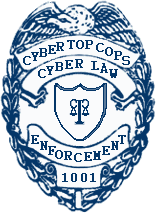American Express Phishing Scams
PLEASE NOTE: American Express is not responsible for these e-mail scams. Organisations and individuals, pretending to be American Express, initiate them. All trademarks and related logos are either trademarks or registered trademarks of their respective owners, or their licensors. Cyber Top Cops is in no way affiliated with American Express. The "Received From" e-mail address mentioned for each e-mail on this page, is a spoofed e-mail address and is not the true origin of the scam e-mail.
UPDATE 24 October 2012:
If you received an e-mail in the last couple of days, appearing to be from American Express, it is most likely a malware related spam e-mail and not a phishing scam. If that is the case, you are probably looking for the American Express Account Alert: A Payment Was Received Malware Spam Example.
Date: 16 September 2007
Received from "American Express" <Service@AmericanExpress.com>
Subject: Official Security Notification

Dear American Express Customer,
Due to the recent phishing attacks targeting American Express we are currently
launching a new security system. In order to benefit from the new services
please follow the link below.
To confirm your account status please AUTHENTICATE and complete the necessary steps.
Failure to authenticate your account may result in account malfunction, slow
online experience or even exposure of sensible data.
Please do not reply to this message. For any inquiries, contact Customer Service.
American Express Copyright © 2007
This looks more like a 419 scammer involved in a phishing scam. 419 scammers love to type everything in capital letters and this phishing scammer could not stress the word AUTHENTICATE quite enough.
"Failure to authenticate your account may result in account malfunction, slow online experience or even exposure of sensible data."
Perhaps the scammers meant "sensitive data", but they were not "sensible" enough to use the right term. Slow online experience? This is actually a very deceptive threat. Every online banking service experience will lag from time to time, especially when a lot of people use the online service simultaneously. No company will make the server lag for one specific client only, just because he/she did not 'authenticate' his/her account. Slow online experiences with your Internet Banking services, may be due to problems with your own Internet connection or ISP, it may be the online banking server that's overloaded or the server may be experiencing technical difficulties. The bottom line is, your bank will never send you an e-mail request to authenticate your bank account.







